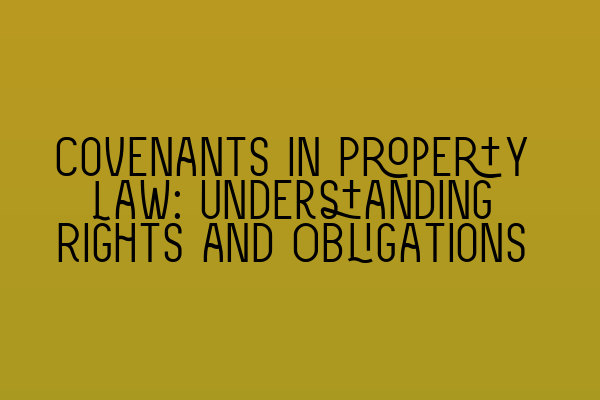Covenants in Property Law: Understanding Rights and Obligations
When it comes to property law, one concept that often arises is the idea of covenants. Covenants are legal agreements or promises between parties that outline certain rights and obligations. These agreements can have a significant impact on property ownership and use. In this article, we will explore covenants in property law, their types, and their implications.
Understanding Covenants in Property Law
Covenants are contractual agreements that bind the parties involved. In property law, covenants are typically associated with land and property ownership. These agreements can be both express, meaning they are explicitly stated in a contract or deed, or implied, meaning they are inferred from the circumstances or nature of the property.
Covenants can create rights or impose obligations on the parties involved. These rights and obligations can affect various aspects of property ownership, such as land use, maintenance, and restrictions on certain activities. It is important for property owners and potential buyers to understand the covenants associated with a property to avoid legal disputes or unexpected obligations.
Types of Covenants
Covenants can be classified into different types, each with its own set of implications. Let’s explore some common types of covenants you may encounter in property law:
- Restrictive Covenants: These covenants impose limitations on the use and development of a property. They are often used to maintain the aesthetic or environmental quality of a neighborhood or protect the interests of neighboring property owners. For example, a covenant may prohibit the construction of certain types of buildings or the commercial use of a residential property.
- Positive Covenants: Positive covenants require a property owner to perform certain actions or provide specific services. These covenants aim to ensure the maintenance and upkeep of a property. Examples of positive covenants may include obligations to maintain a fence, contribute to the maintenance of shared facilities, or pay annual fees for landscaping services.
- Equitable Covenants: Equitable covenants arise when a court enforces a promise made between parties, even if it is not included in a formal agreement or deed. These covenants can be particularly important in cases where a property has changed hands multiple times, and the original covenants may not be explicitly provided to the current owner.
These are just a few examples of the types of covenants that can be encountered in property law. It is crucial to review the specific covenants associated with a property before making any decisions or commitments.
Implications of Covenants in Property Law
Covenants can have significant implications for property owners. Understanding these implications is essential for maintaining legal compliance and avoiding potential disputes. Here are a few key points to consider:
- Enforcement: Covenants can be legally enforceable, meaning non-compliance can lead to legal action. This underscores the importance of adhering to the obligations outlined in a covenant.
- Duration: Covenants can have a specific duration, meaning they may expire after a certain period. However, some covenants may run with the land, meaning they are binding on future owners as well.
- Modification: In some cases, it may be possible to modify or release certain covenants. This usually requires the consent of all parties involved or approval from a court.
To fully understand the implications of covenants in property law, it is advisable to consult with a qualified property law solicitor. They can provide guidance on specific covenants and ensure compliance with legal obligations.
Conclusion
Covenants play a significant role in property law, shaping the rights and obligations of property owners. Whether they are restrictive, positive, or equitable covenants, these agreements can have long-lasting implications for the use and enjoyment of a property.
Understanding and adhering to covenants is crucial for property owners and potential buyers alike. Expert legal advice can help navigate the complexities of covenants and ensure compliance with legal obligations.
For more information on property law and other relevant topics, be sure to check out our related articles:
- SQE 1 Practice Exam Questions
- SQE 1 Practice Mocks FLK1 FLK2
- SQE 2 Preparation Courses
- SQE 1 Preparation Courses
- SRA SQE Exam Dates
If you have any questions or require legal assistance regarding covenants or property law, don’t hesitate to contact SQE Property Law & Land Law. Our team of solicitors specializes in property law and can provide expert advice tailored to your specific situation.
